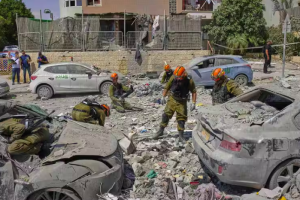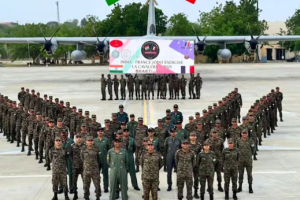News Desk TTP :
Iran and Pakistan have engaged in tit-for-tat airstrikes on militant targets on each other’s territory, in an unprecedented escalation of hostilities between the two neighbors. The strikes have raised the stakes in a region already beset by conflicts and crises, and have drawn calls for calm from the UN and the US.
The cycle of violence began on Tuesday, when Iran launched drone and missile strikes on the Sunni militant group Jaish al-Adl in Pakistan’s Balochistan province, killing two children and wounding several others, according to Pakistani authorities. Iran claimed it had “only targeted Iranian terrorists on the soil of Pakistan” and that no Pakistani nationals were harmed.
Pakistan strongly condemned the Iranian attack as “an egregious violation of international law and the spirit of bilateral relations” and summoned its ambassador in Tehran to protest. Pakistan also barred the Iranian envoy in Islamabad from meeting with its foreign minister.
On Thursday, Pakistan retaliated by conducting “a series of highly coordinated and specifically targeted precision military strikes” on several alleged separatist hideouts in Iran’s Sistan and Baluchestan province, killing at least seven people, mostly women and children, according to Iranian authorities. Pakistan said it had acted in self-defense and accused Iran of harboring militants who have carried out attacks on Pakistani soil.
The two countries share a volatile border of about 900 kilometers (560 miles), where both have long fought militants belonging to the Baloch ethnic minority, who seek greater autonomy or independence from both states. The Baloch insurgents have staged several attacks on security forces and civilians on both sides of the border, as well as on oil and gas pipelines and other infrastructure.
The cross-border strikes have exposed the deep mistrust and animosity between Iran and Pakistan, which have traditionally maintained cordial but wary ties. The two countries have different religious and geopolitical orientations, with Iran being a Shia Muslim theocracy and a regional rival of Saudi Arabia and the US, while Pakistan being a Sunni Muslim democracy and a close ally of both.
The strikes have also coincided with a broader escalation of tensions in the Middle East, where Iran and its allies and proxies have been clashing with Israel and its allies over the ongoing war in Gaza, the nuclear deal, and the regional balance of power. Iran has also conducted missile strikes against alleged Israeli spy bases and terrorist sites in Syria and Iraq, claiming to avenge the killing of its top nuclear scientist and the commander of its elite Quds Force.
The UN and the US have expressed concern over the situation and urged both Iran and Pakistan to exercise restraint and resolve their differences through dialogue. The UN Secretary-General Antonio Guterres said he was “deeply alarmed” by the reports of civilian casualties and called for “an immediate cessation of hostilities”. The US State Department spokesperson Ned Price said the US was “monitoring the situation closely” and encouraged both countries to “avoid further escalation”.
The conflict has also sparked outrage and grief among the public and the civil society in both countries, who have demanded justice and accountability for the victims and their families. The conflict has also raised questions about the effectiveness and regulation of the counter-terrorism operations and the border security measures in both countries.











Add Comment